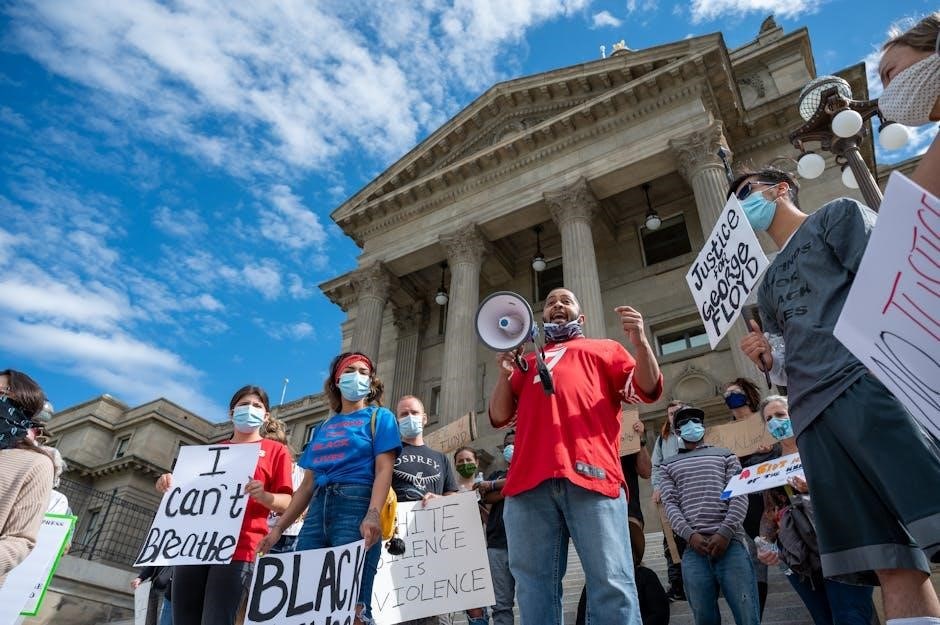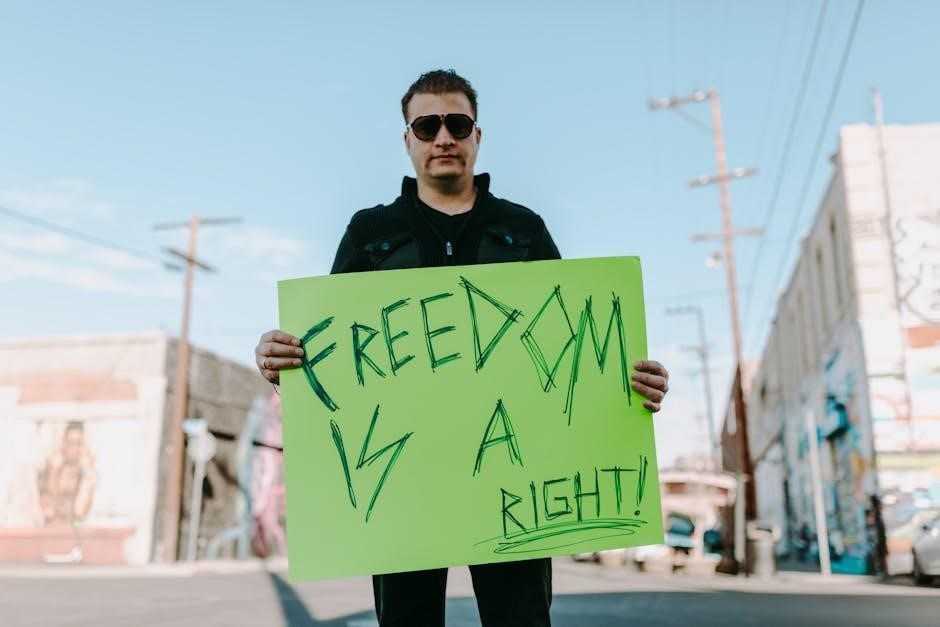Michael Sandel’s Justice: What’s the Right Thing to Do? explores ethical dilemmas, blending philosophy with real-world examples to provoke thought on morality and society.
1.1 Overview of Michael Sandel’s Approach to Justice
Michael Sandel’s approach to justice combines philosophy with real-world examples, encouraging critical thinking about morality and society. His Harvard course and book, Justice: What’s the Right Thing to Do?, explore ethical dilemmas, blending theory with practical cases. Sandel emphasizes the importance of public discourse, challenging readers to question their assumptions about justice, rights, and fairness. His engaging style makes complex ideas accessible, fostering a deeper understanding of justice in everyday life and its impact on individuals and communities.
1.2 Importance of Ethical Dilemmas in Understanding Justice
Ethical dilemmas are central to understanding justice, as they challenge individuals to question their assumptions about morality and fairness. Michael Sandel uses real-world examples to illustrate how ethical conflicts reveal the complexities of justice, encouraging critical thinking and public discourse. By grappling with these dilemmas, individuals can better understand the principles that guide justice and their application in society, fostering empathy and a deeper commitment to ethical decision-making in both personal and collective contexts.
The Concept of Justice in Modern Society
Justice in modern society is shaped by legal frameworks and ethical principles, addressing issues like legal ordering and distributive justice, while sparking discourse on fairness and equality.
2.1 Legal Ordering and Its Impact on Urban Life
Legal ordering shapes urban life through structured laws and governance, influencing social hierarchies and resource distribution. It establishes frameworks for maintaining order, addressing conflicts, and ensuring public safety. Legal ordering systems, such as citadel law, police law, and laws of exception, reflect power dynamics, impacting how cities function. These systems often aim to balance control with individual freedoms, forming the backbone of urban societies and their ethical foundations.
2.2 Distributive Justice: Rights, Liberties, and Resources
Distributive justice focuses on the fair allocation of rights, liberties, and resources within society. It addresses how primary goods, such as income, wealth, and opportunities, are distributed. This concept emphasizes ensuring individuals have access to essential resources and freedoms, promoting equality and fairness. Distributive justice seeks to balance individual entitlements with societal needs, forming a cornerstone of ethical governance and equitable living conditions in modern societies, as discussed in Sandel’s exploration of justice.

Moral and Ethical Foundations of Justice
Moral and ethical foundations of justice explore timeless questions about right and wrong, drawing from Aristotle’s reflections on the good life and medieval concepts of fairness.
3.1 Aristotle’s Reflections on Justice and the Good Life
Aristotle believed justice is intertwined with the pursuit of the good life, arguing that understanding justice requires reflecting on the most desirable way of life. He maintained that law cannot be separated from ethics, emphasizing that a just constitution must align with moral virtues. Aristotle’s philosophy underscores the importance of character and the common good in achieving justice, providing a foundational framework for ethical inquiry into societal norms and legal systems.
3.2 The Role of Tradition and the “Just Price” in Medieval Thought
Medieval philosophers and theologians emphasized the concept of the “just price,” believing goods should be exchanged based on tradition or divine order. This principle, rooted in moral and religious beliefs, aimed to ensure fairness and prevent exploitation. It was not determined by market forces but by ethical guidelines, reflecting the value of maintaining social harmony and justice. This approach highlighted the interplay between tradition, morality, and economic transactions in achieving a just society.
Legal vs. Ethical Justice
The tension between legal and ethical justice often arises when law and morality conflict, challenging individuals to determine the right course of action.
4.1 The Tension Between Law and Morality
The tension between law and morality is a recurring theme in justice, where legal systems often conflict with ethical principles. Sandel highlights cases where adhering to the law may violate moral standards, and vice versa. This conflict challenges individuals to question whether justice should prioritize legal frameworks or moral obligations. Such dilemmas demand a nuanced understanding of both legal and ethical perspectives to navigate effectively.
4.2 Case Studies: Murder Under Extreme Circumstances
Sandel examines a legal and moral quandary involving murder under extreme circumstances, where the law may condemn the act, but moral reasoning could justify it. This case study highlights the tension between legal and ethical justice, challenging society to weigh moral culpability against mitigating factors. Such dilemmas underscore the complexity of applying universal principles to extraordinary situations, forcing a reevaluation of justice’s true meaning and application in human affairs.
Theories of Justice Explored
Exploring utilitarianism and Kantian ethics, Sandel examines how these theories shape our understanding of justice, offering insights into morality and the right course of action.
5.1 Utilitarianism and Its Critique
Utilitarianism, emphasizing actions that maximize overall happiness, is critiqued by Sandel for prioritizing collective well-being over individual rights. He argues that such an approach may justify morally questionable decisions, highlighting its limitations in resolving complex ethical dilemmas. Sandel’s critique challenges the practicality of applying utilitarian principles universally, urging a more nuanced consideration of justice that balances utility with moral integrity and individual dignity.
5.2 Kantian Ethics and the Categorical Imperative
Kantian ethics, rooted in Immanuel Kant’s philosophy, emphasizes moral duties and the Categorical Imperative, which calls for actions that could be universal laws. Sandel explores Kant’s principle of treating individuals as ends, not means, critiquing its rigidity in real-world scenarios. While Kant’s framework prioritizes moral consistency, Sandel argues it may neglect context and consequences, highlighting the tension between deontological ethics and practical justice. This critique enriches the debate on moral reasoning and its application in society.

Justice in Practice: Real-World Applications
Sandel illustrates justice through real-world scenarios, emphasizing how power and opportunity shape distributive justice and moral decision-making in society.
6.1 Sandel’s Use of Real-World Examples to Illustrate Justice
Sandel employs vivid real-world examples to bridge theory and practice, making complex philosophical concepts accessible. His approach highlights how justice applies to everyday dilemmas, encouraging critical reflection on morality and society. By examining cases like Murder Under Extreme Circumstances, Sandel demonstrates the tension between legal and ethical justice, showing how power and opportunity influence distributive justice. These examples provoke thought and engage audiences in exploring justice’s practical implications.
6.2 The Role of Power and Opportunity in Distributive Justice
Power and opportunity significantly influence distributive justice, shaping access to resources and rights. Sandel highlights how systemic inequalities and power imbalances affect the distribution of goods, often favoring those with greater influence. Opportunities, such as education and economic mobility, are unevenly distributed, perpetuating injustice. Addressing these disparities is crucial for creating a fair society where justice is not solely determined by power but by equitable principles ensuring all individuals can thrive. This reflects Sandel’s emphasis on moral accountability in distribution.

The Common Good and Democracy
Justice serves as the foundation for a desirable society, ensuring the well-being of all members. It balances individual rights with collective welfare, fostering democratic values and fairness.
7.1 Justice as a Foundation for a Desirable Society
Justice is essential for creating a harmonious society, ensuring fairness and equality. It fosters trust, cooperation, and prosperity, enabling individuals to thrive collectively. A just society prioritizes the common good, balancing individual rights with shared responsibilities, and promotes ethical governance. Sandel emphasizes that justice is not merely a legal concept but a moral imperative that shapes societal values and aspirations, encouraging dialogue on what kind of world we wish to inhabit.
7.2 The Intersection of Justice and Political Discourse
Justice is deeply intertwined with political discourse, shaping policies and societal values. Sandel argues that justice is not just a legal concept but a moral framework for governance. It influences how resources are distributed and rights are protected, fostering debate on the common good; Political discourse often reflects competing visions of justice, requiring public reasoning to reconcile individual freedoms with collective responsibilities. This intersection highlights the need for ethical clarity in addressing societal challenges and fostering a just society.
Justice in Everyday Life
Justice is not just a philosophical concept but a practical guide for daily decisions, influencing how individuals and society address fairness, rights, and responsibilities.
8.1 Applying Justice to Contemporary Issues
Applying justice to contemporary issues involves addressing challenges like economic inequality and climate change. Sandel’s approach emphasizes using real-world examples to evaluate theories of justice, ensuring they remain relevant and applicable. By examining legal frameworks and distributive justice, individuals can better understand the balance between individual rights and collective well-being, fostering a more equitable society. This method encourages active engagement with ethical dilemmas, promoting justice in everyday life.
8.2 The Role of Individual Responsibility in Promoting Justice
Individual responsibility plays a crucial role in promoting justice by empowering people to act morally and ethically. Sandel emphasizes that justice is not solely the domain of legal systems but also requires personal accountability. By engaging with ethical dilemmas and advocating for fairness, individuals can drive societal change. Education and critical thinking are essential in nurturing this sense of responsibility, enabling people to contribute to a more just and equitable world.

The Role of Education in Shaping Justice
Education fosters critical thinking, enabling individuals to engage with ethical dilemmas and understand justice. Sandel’s Harvard course exemplifies how learning shapes moral reasoning and societal values.
9.1 Sandel’s Harvard Course on Justice
Michael Sandel’s Harvard course, “Justice,” is renowned for its engaging exploration of ethical dilemmas. It challenges students to think critically about morality, rights, and societal values. By using real-world examples, Sandel creates a dynamic learning environment that fosters debate and reflection. The course’s popularity stems from its ability to connect abstract philosophical concepts with everyday issues, making complex theories accessible to a broad audience. This approach has made it one of Harvard’s most popular classes, sparking global discussions on justice.
9.2 The Importance of Critical Thinking in Ethical Education
Critical thinking is essential in ethical education, as it enables individuals to analyze complex moral dilemmas and evaluate competing perspectives. By fostering open-mindedness and logical reasoning, it encourages students to question assumptions and develop well-reasoned judgments. This skill is vital for navigating real-world ethical challenges and promoting justice in society. Sandel’s approach emphasizes dialogue and debate, ensuring that ethical education not only informs but also empowers individuals to engage thoughtfully with moral issues.
Michael Sandel’s work underscores the enduring relevance of justice, inviting dialogue and reflection on morality. His insights inspire a deeper understanding of ethical dilemmas in modern society.
10.1 Summarizing Key Insights from Sandel’s Work
Michael Sandel’s work highlights the complexity of justice, emphasizing the need to balance individual rights with the common good. He challenges readers to engage with ethical dilemmas, advocating for a society that prioritizes moral reasoning over political compromise. By exploring diverse perspectives, Sandel’s insights encourage a deeper understanding of justice, urging continuous dialogue to shape a fair and equitable world for all.
10.2 The Need for Continuous Dialogue on Justice
Continuous dialogue on justice is essential for fostering a society that values fairness and equality. Sandel underscores the importance of ongoing conversations to address evolving moral challenges. By engaging diverse perspectives, societies can refine their understanding of justice, ensuring it remains relevant and equitable. Open dialogue not only promotes mutual understanding but also drives collective progress, making justice a shared pursuit rather than a static concept.


